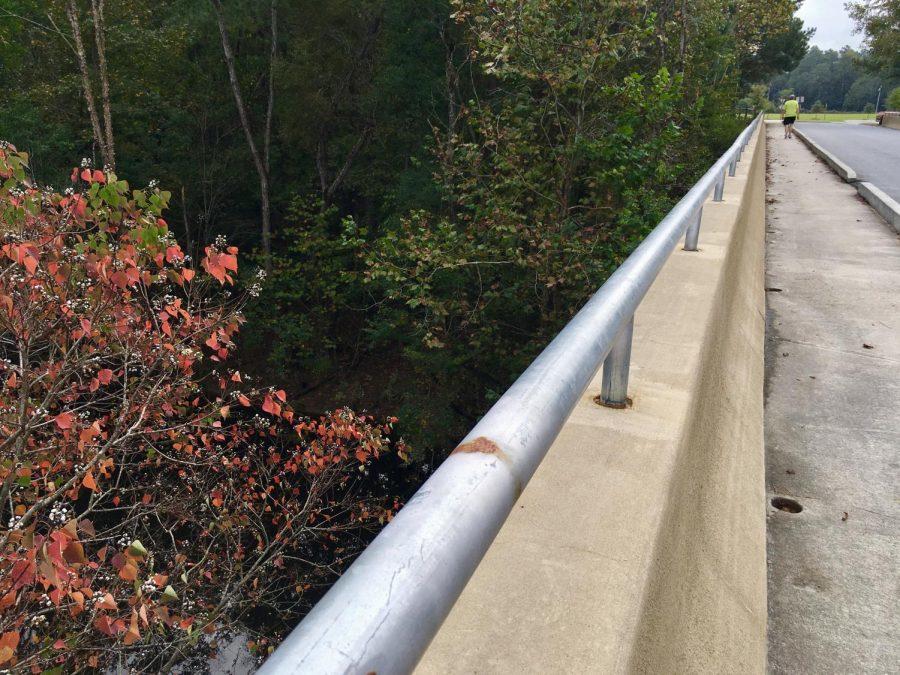
Caption
The Chinese tallow tree, with its brilliant fall color and popcorn-like clusters of fruit, is beautiful but this is one of invasive species taking over Amerson River Park.
Credit: Liz Fabian/Macon Newsroom

The Chinese tallow tree, with its brilliant fall color and popcorn-like clusters of fruit, is beautiful but this is one of invasive species taking over Amerson River Park.
When Bob Sargent walks his dog at Amerson River Park, he sees plenty of living things that don’t belong there.
“There are a lot of tallow trees,” Sargent told members of the newly-formed Arbor Conservation Board that he chairs.
The Chinese tallow or “popcorn tree” was first introduced to the United States in the 1700s and is considered an invasive species which can take over a landscape and choke out native plants.
“It was brought here because of its ornamental value but now it’s in a lot of the natural areas,” said Karol Kelly, Macon-Bibb extension agent.
On Kelly’s recent drive over the park bridge, a tallow’s brilliantly shaded red and orange, aspen-looking leaves with branches of popcorn-like clusters of fruit, caught her eye.
“It’s a pretty tree,” she said. “If you float down the Ocmulgee… you see all of these beautiful trees but it’s just tallow tree after tallow tree after tallow tree, so it’s really hurting the diversity of the plants where those invasive plants are.”
On Halloween, volunteers are invited to the “Invasion of the Plant Snatchers,” a workday at the park to teach people how to identify and remove invasive plants. It is the first public service project of the Arbor Conservation Board.
Elaeagnus, or Russian olive which is native to Asia, is another shrub that’s popular in home landscapes because of its fast-growing ability to become a privacy screen.
“Once it gets the fruit on it, the birds eat the fruit and they’ll fly across the way and make more elaeagnus plants all over the place so it’s really the numbers of the invasive plants as they take over an area.”
Beside one of the park’s concrete paths, a patch of Chinese privet covers the ground in a grove of trees.
“The privet and the tallow trees and things like that, they just completely take over,” Kelly said. “If you think about it from the ground up, that affects the insects that are eating on it or not eating on it, which impacts the birds, which it potentially impacts the whole food chain one way or another and it’s blocking out light for the native plants.”
Crews of volunteers will be working with the Macon-Bibb County Parks and Beautification Department, the Georgia Forestry Commission, NewTown Macon and the Arbor Conservation Board to cut the plants down to the ground and apply herbicide only to that limited area.
“Fall’s a good time to do that because the sap is going back down into the roots,” she said.
Michael Glisson, director of Macon-Bibb’s Parks and Beautification department who also serves on the Arbor Conservation Board, had a word of caution.
“An important thing to remember, if you wipe out a whole bank of privet then we’ll have erosion problems,” Glisson said.
Saturday’s first workday will be supervised and concentrate on safer areas to negotiate than the river bank.
“Georgia Forestry Commission does provide some funding for this, but what really makes things like this work, is people power,” said Seth Hawkins, a Georgia Forestry Commission community forester who is a member of the conservation board.
Anyone wishing to volunteer must register by calling 478-751-6338 or emailing uge2021@uga.edu by Friday so organizers can have enough supplies on hand.
Workers are urged to wear jeans or sturdy pants and closed-toes shoes. Work gloves and insect repellant would be helpful. Hand tools are available but anyone is welcome to bring their own.
“Getting out and pulling invasive species by the root or cutting and spraying them can be challenging but I’m sure they’ll have a job for every skill level,” Hawkins said.
The attack on invasives begins at 9 a.m. Saturday at 2551 N. Pierce Ave. and volunteers will meet organizers at the stone pavilion parking area. Social distancing is encouraged and there is plenty of room to spread out in the park, Kelly said.
“We could work for years in here, there are so many invasives."